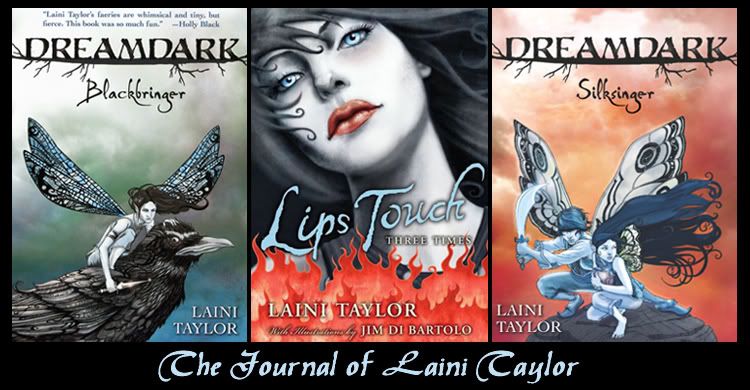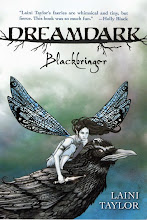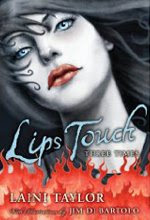 Yesterday, it was "Once upon a time."
Yesterday, it was "Once upon a time." That is, I stepped way back from the story, from any attempt at an intimate narrative style that is "inside the scene" with the characters, and instead of trying to "dramatize" the scene, I just "narrated" it. I actually started with "once upon a time" because those words set a certain tone. You know how fairy tales are not told intimately? Details are skimmed over, the tale is painted in very broad strokes? Like this: Snowdrop grew up and became more and more beautiful, so that when she was seven years old she was as beautiful as the day, and far surpassed the Queen. That sentence encompasses a lot of story, with no detail or emotion. We're on the outside, being told something by a storyteller. We're not in there with Snowdrop, experiencing her growing up and growing beautiful.
In the Dreamdark books, I strive to dramatize almost every scene of the story, rather than have an external narrative voice. The storytelling is coming from inside the scene rather than outside it. Does that makes sense? This kind of writing is challenging, especially in the early days of a project when people and places aren't "real" to me yet as the writer, as the people and places of "Bad-Ass Sci-Fi Novel" are not real yet. It's hard to really get inside a scene under those circumstances. It's like standing on the foundation of a house that hasn't been build yet, and trying to imagine you're in a house. At its worst, it can be like trying to walk up stairs that haven't been built yet. You know?
It's much easier to write a scene like it's a fairy tale and I'm the storyteller and I'm watching the events, not feeling compelled to capture emotional truth or great dialogue -- neither of those things are hallmarks of fairy tales, yeah? So that was my strategy yesterday, in an attempt to move forward several "seven-league boot strides" in the story. I backed way up and narrated events from a distance, trying to keep myself in the mind set of writing a fairy tale.
This is more or less a variation of an exercise in Not For Robots called "Bedtime Story" when you write as if you were telling a bedtime story to a beloved child. Things must keep happening, the story must keep unspooling; you don't stop and work on a sentence for an hour; you don't worry if your characters are talking to each other, you just tell what happens, and try to keep it interesting.
So that was what I tried to do yesterday, and I wrote just shy of 4000 words. There were plenty of places where I forgot and "zoomed in" and got in my characters' thoughts, and that's okay. When their thoughts stopped being interesting, I zoomed back out.
So there's a possible strategy for covering ground in a first draft. If you're stuck, try writing it like it's a fairy tale. Start with the words "Once upon a time." It doesn't matter if it is not a fairy tale ("Bad-Ass Sci-Fi Novel" certainly isn't), or if you are picking up writing in the middle of Chapter Seventeen. Just for the sake of getting events rolling, try it. It's a great way to make those seven-league boot strides over the wishy-washy middle of a first draft.
I don't know about you, but this idea of "narration" versus "dramatization" is a recent revelation to me. I mean, I was making the distinction in my writing before I could have explained the difference. It was a little comment in the margins of Lips Touch, from my editor Arthur Levine, that caused a lightbulb to go off. All he wrote there was something like, "Flesh this out; this moment is important enough to dramatize," and suddenly I got it! Lips Touch, by the way, has more of a combo narration/dramatization style than Dreamdark, which are more pure dramatization. I really enjoy both styles, and I am not at all sure what THIS book will be.
Does this make sense, this distinction? I want to come up with examples some time, and add a bit to Not For Robots to make it clearer.
Anyway, the point is: try everything and anything to keep your story moving forward. If one strategy isn't working, try something else. DO NOT GIVE UP.
 A very quick book mention. Ghosts of Kerfol by Deborah Noyes, is a ghost story set in a Breton chateau, spanning four centuries and told in five vignettes across the ages. Inspired by Edith Wharton's ghost story "Kerfol," it begins with the tragic events in 1613 that *spawned* the ghosts, and then peers into various incidents of haunting that follow, with varyingly tragic consequences. A cool idea, and the writing is beautiful. Lines like this: I saw at once with grave alarm that his lashes were a bleached shade of copper, like snow where the hawk has hunted. . . and he turned and smiled at her, and the smile hurt like a fall on the ice. . . Also, this is a very quick read. Two hours, maybe. Cheers!
A very quick book mention. Ghosts of Kerfol by Deborah Noyes, is a ghost story set in a Breton chateau, spanning four centuries and told in five vignettes across the ages. Inspired by Edith Wharton's ghost story "Kerfol," it begins with the tragic events in 1613 that *spawned* the ghosts, and then peers into various incidents of haunting that follow, with varyingly tragic consequences. A cool idea, and the writing is beautiful. Lines like this: I saw at once with grave alarm that his lashes were a bleached shade of copper, like snow where the hawk has hunted. . . and he turned and smiled at her, and the smile hurt like a fall on the ice. . . Also, this is a very quick read. Two hours, maybe. Cheers!









8 comments:
"the smile hurt like a fall on the ice" -- Ohmyword, that's good.
Thanks (as always!) for sharing your process. I'll try this tonight & hope for a nice jump in word count too.
Like, a REALLY nice jump in word count.
Miraculous, even.
Great job, Laini! You're welcome to join us in our novel-writing whip-cracking-fest! I can't believe I wrote 10K words in two days and am attempting to do it again...I'm inspired by you!
Yeah, I'm not sure I believe you guys. 4000? 10 000?? Man. But okay then, since I know you're not liars. I just don't see how I could do it.
I do get the distinction between narration and dramatization. I am just not very good at the narration. I digress and flesh out and fall in love with phrases, and before I know it I'm dramatizing. I don't think I've ever finished an outline.
I'm in awe of all of you who are writing this month. So glad to hear that you didn't give up. Your thoughts are great and it's neat to get a peek "inside an author's head."
I love this idea. I shall try it tomorrow :-)
makes total sense. Thanks for the tip!
Your point about writing from inside the scene rather than out of it is so to the point--i wish I'd thought of that when writing my book Make a Scene! Darn it.
:)
J
Laini,
I've heard of this technique somewhere else recently. Maybe in one of James Frey's books on writing? The idea of the first draft is to just get the basics down, and whoever-it-was pointed out that you can always come back and fill the details in later.
The way I see it, this sort of rapidly-written first draft is acting as a stand-in for an outline or "step sheet" as Frey would call it. You're brainstorming, so you shouldn't fret the small stuff.
I think the problem comes from expecting to write something perfect right off the bat. And though some writers use that technique, I doubt anyone can do it in one short month!
Post a Comment